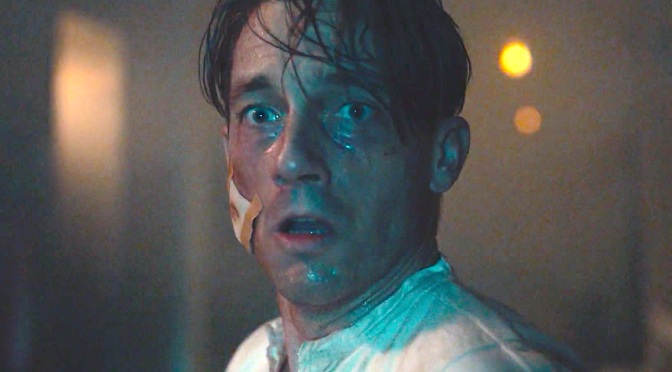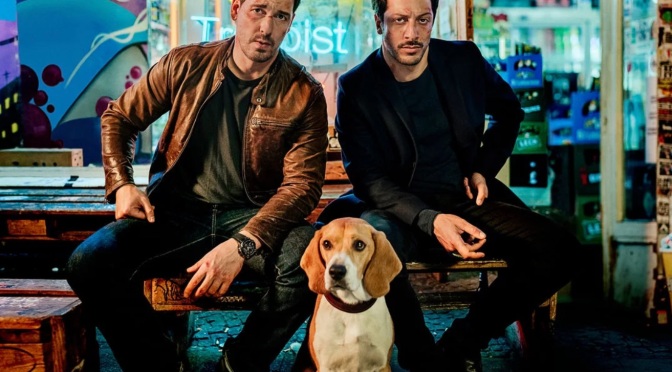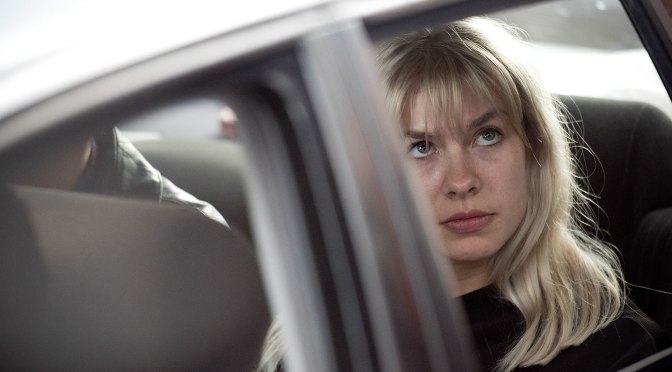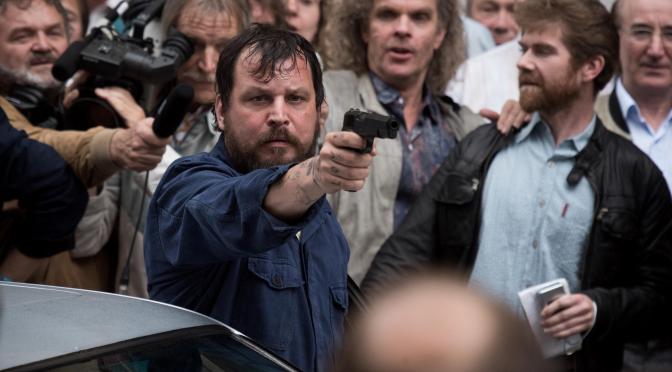
A few years ago the UK was gripped by the manhunt for Raoul Moat, who had gone on the run after shooting his former partner and her new boyfriend. Rolling coverage of the investigation reached fever pitch when Moat was thought to be holed up somewhere near a small town called Rothbury and the media duly descended, filling the airtime with impressive aerial shots of nearby woodland and puff-piece psychologist interviews determining the fugitive’s state of mind. The press were desperate for anything they could lead with, and in among all this was Sky News’ anchor Kay Burley – who had been airlifted in by helicopter no less – and was on the hunt for some suitable soundbites from the local population. Thrusting her microphone into the face of a sweet little old lady minding her own business in the town, she dramatically asked “Aren’t you SCARED?”, expecting the pensioner to clutch her pearls and give her a trite response of the terror this hunt has surely caused her. “Oh no’, the lady calmly replied, ‘Not at all. I’ve led a long life and seen many things in my time. I’m not scared at all.” CUT! Interview ends.
It’s an amusing anecdote but one I recall when discussing how the press are as guilty of wanting to bend the facts to their own narrative just as much as politicians or the police (and not least also proof of the indomitable spirit of British pensioners). In this post-truth age, the world requires instant gratification and that need affects how we digest our news too – opinion is more polarised than ever but lacks the nuance to actually be informative given the short attention span that is required for a 24 hour news cycle. Therefore we’ve been reduced to becoming almost passive vessels for every new outrage or crisis that emerges and the result is people are becoming more disconnected than ever with the world around them in a bid to cope, with the sinking feeling that they feel their own voices aren’t heard or valued as much as they hoped.
This phenomenon didn’t start overnight. Post-Watergate, the world and how it was reported was changing. Investigative Journalism took huge leaps forward and shone a light on those in power. But somewhere the integrity within journalism got lost along the way. Newspapers were failing in the wake of the golden age of television, much like they would struggle in the age of the internet. Papers were bought and sold and began to reflect more candidly the views of their owners rather than the views of the people. The scale of institutional scandals like Hillsborough, Orgreave or the Battle of the Beanfield would remain hidden for decades thanks in part to the complicity of newspapers. Some have still yet to be fully exposed.
People’s views on the organs of authority were also changing – police, government, media – and that view was they were not to be trusted, that they represented big business, or that at the very least it was money that began to dictate policy over societal change. From these seeds the age of the conspiracy grew, but despite the colorful and inventive semantics that sprang from that, conspiracies were only ever the dull desperation of powerful men covering up the official incompetence of other powerful men. This era saw more incompetence than most in the changing faces of society, and all of this waffle is what really informs the background of 54 Hours – The Gladbeck Hostage Crisis.
Before we can talk about the incompetence that led to one of the blackest marks in post-war Germany criminal history, there is a lot of hindsight that colours the characters involved. The 1970s saw huge change in the country, not least the rise of political terrorism with the actions of the Baader-Meinhoff gang and the Munich Olympics hostage drama having a massive impact on the country’s psyche. The legacy of these events were very evidently present in the decisions and frustrations of the officers and officials involved in the Gladbeck case.
Unfortunately for 54 Hours – The Gladbeck Hostage Crisis this isn’t really examined in any great detail at all. German television is usually fantastic at surgically examining its own past without bias, as seen in the excellent Netflix drama NSU – German History X which unflinchingly showed the incompetence of the police in capturing the neo-Nazi National Socialist Underground for over a decade. Instead, the Gladbeck film plays like a traditional TV movie with an accurate telling of the facts, but with little comment made on the nature of this crime that had such an impact on German society.
For the most part, this first half plays like a prologue to the most famous aspect of the case – the hijacking of a bus full of passengers which will be focused on in the final episode. Instead, we get to see what leads to that situation and the keyword is frustration throughout – at the characters choices, at the police, at the press, at the gawking crowds of public – until it’s almost unbearable to watch. One sleepy Sunday morning in August 1988, two career criminals Dieter Degowski and Hans-Jürgen Rösner decide to rob a bank. But they don’t do it well or quietly and it’s not long before they are in a stand-off with police with two clerks as hostages. With a ninety minute running time I would have expected some depth to the characterisation around this quartet and their behaviours – but instead we barely got to know them, with the focus being more on the interchangeable cast of hostage negotiators and their disastrous attempts to try and coax the kidnappers out of the bank.
This task isn’t helped by the media, who are seen setting up their cameras right next to snipers, calling the criminals in the bank for interviews and generally getting in the way of a live hostage situation. But there isn’t much made about this by the director beyond showing it. Compared to the subtle commentary against the press in the similarly-themed 6 Days, which replayed the events of the Iranian Embassy siege, it feels like a missed opportunity. Admittedly this isn’t fiction, and most of those involved are still alive so a light touch might have been the prevailing choice by the film-makers – but real-life crime drama can still take risks with its subject matter if it’s to tell us anything prudent about the wider picture these incidents create.
Ultimately Degowski and Rösner escape the bank with the two clerks still held hostage, and the remainder of the episode follows their erratic journey to the border pursued by both police and press. This whole situation should be fraught with tension, but is weirdly lacking in any – even when the hostages are left on their own by their kidnappers and you think they might make a break for it there is little to no excitement involved. Instead we witness two incompetent criminals bumble their way through Germany as officials fret over their ‘zero risk strategy’ – a virtually impossible scenario where they can take both kidnappers out of the picture without harming the hostages. This scenario is tested repeatedly in every new situation with diminishing results, as the varying officials involved seem desperate not to have the authority to agree a kill shot or to make any type of move at all. In one scene the original negotiation team pass responsibility to the national crime squad and the audible sigh of relief from them speaks volumes.
With little to no time spent on exploring the characters involved in the kidnapping, we do get some leaden direction introducing two people who so are clearly doomed that even if you have no knowledge of this case it is plainly obvious they are marked for death. Little is made of them as actual people – we just get a window into their daily lives as young Emanuele looks after his sister and muses on the girl who’s just dumped him or spirited Silke who works at the crown court and dreams of the day she can marry her boyfriend. Both are unfortunate enough to get on the ill-fated bus, and both are unfortunate enough to have their fates almost telegraphed to the viewer in the ill-advised trailer for the following episode.
There is much to dislike about 54 Hours – The Gladbeck Hostage Crisis, but the worst thing is it feels like a missed opportunity hurriedly issued to mark the 30th year anniversary of the case. Nobody involved is afforded the time to feel settled in their role and thus characters come and go with little to distinguish them, especially on the police side of things. The press are portrayed flatly as having little disregard for their own lives, chasing after men who are quite happy to shoot at them and the public. But we don’t get to focus on one journalist and understand their motives better, they are just represented as a mass of people doing a better job than the police of tracking – and in some cases even aiding – the criminals escape. For such a hugely important case it feels like a poor epitaph to those involved and inexcusable in the era of German television that can afford us excellent historical drama like Deutschland 83, Babylon Berlin or The Same Sky.
Random Thoughts
- People in 1980s Germany seem remarkably calm in the face of a man shooting a gun in the street – everybody just carries on as if it’s not happening
- EVERYBODY smoked in 1988
- Apparently a sausage in a bun isn’t a thing in Germany
- This show was gold dust if you like boxy 80s cars
- I bet the guy who delivered the cash in his undies wished he hadn’t worn bright red budgie smugglers that day
- The BBC were very impressed with themselves ahead of the show starting. “BBC4 – The Real Home of International Drama” they said breathlessly – prove it and give us a Trapped S2 air date then.
- For a terrifying true story along the same lines dig out the Brazilian documentary Bus 174
- For a film that actually has something to say about journalism and voyeurism check out the excellent Nightcrawler
Andy D










